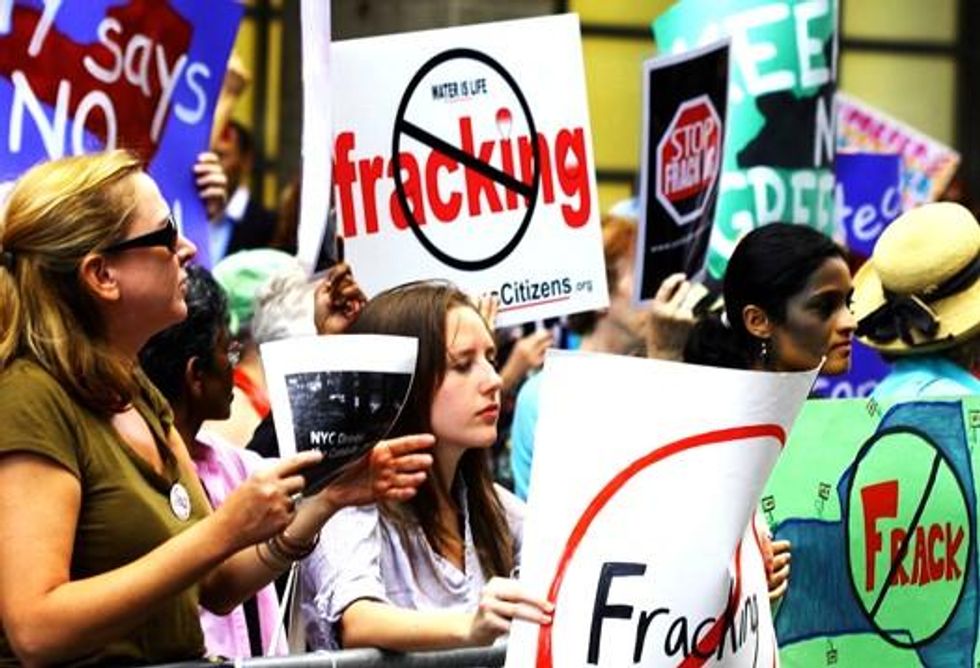

SUBSCRIBE TO OUR FREE NEWSLETTER
Daily news & progressive opinion—funded by the people, not the corporations—delivered straight to your inbox.
5
#000000
#FFFFFF
To donate by check, phone, or other method, see our More Ways to Give page.


Daily news & progressive opinion—funded by the people, not the corporations—delivered straight to your inbox.
Nothing shows the dangerous connection between drought and fracking more than the study released by the journal Nature this week, which shows groundwater demand is exceeding supply, particularly in agricultural zones. Not only is the oil and gas industry turning our rural areas into sacrifice zones, it is also diverting water that is needed to grow food.

Drilling and fracking is not only a threat to water quality -- it also uses massive amounts of water, removing much of the water used from the water cycle altogether.
Unbelievably, even during horrendous drought conditions, oil and gas companies are able to continue using our freshwater resources while communities pay for pricy technologies like water reclamation plants, as we see in Big Spring, Texas. And in Colorado, farmers are competing with the oil and gas industry, who are driving up prices at water auctions.
Fracking is not only a problem for consumers and farmers in the United States. France and Bulgaria have banned fracking thanks to the risks to water and agricultural areas. More communities, from South Africa to Australia, are fighting it as well. On September 22, these communities will join together for a global day of action to tell decision makers around the world that fracking should be banned. We can't sacrifice our public health, our environment and communities, and there is no replacement for our diminishing water resources.
Dear Common Dreams reader, The U.S. is on a fast track to authoritarianism like nothing I've ever seen. Meanwhile, corporate news outlets are utterly capitulating to Trump, twisting their coverage to avoid drawing his ire while lining up to stuff cash in his pockets. That's why I believe that Common Dreams is doing the best and most consequential reporting that we've ever done. Our small but mighty team is a progressive reporting powerhouse, covering the news every day that the corporate media never will. Our mission has always been simple: To inform. To inspire. And to ignite change for the common good. Now here's the key piece that I want all our readers to understand: None of this would be possible without your financial support. That's not just some fundraising cliche. It's the absolute and literal truth. We don't accept corporate advertising and never will. We don't have a paywall because we don't think people should be blocked from critical news based on their ability to pay. Everything we do is funded by the donations of readers like you. Will you donate now to help power the nonprofit, independent reporting of Common Dreams? Thank you for being a vital member of our community. Together, we can keep independent journalism alive when it’s needed most. - Craig Brown, Co-founder |
Nothing shows the dangerous connection between drought and fracking more than the study released by the journal Nature this week, which shows groundwater demand is exceeding supply, particularly in agricultural zones. Not only is the oil and gas industry turning our rural areas into sacrifice zones, it is also diverting water that is needed to grow food.

Drilling and fracking is not only a threat to water quality -- it also uses massive amounts of water, removing much of the water used from the water cycle altogether.
Unbelievably, even during horrendous drought conditions, oil and gas companies are able to continue using our freshwater resources while communities pay for pricy technologies like water reclamation plants, as we see in Big Spring, Texas. And in Colorado, farmers are competing with the oil and gas industry, who are driving up prices at water auctions.
Fracking is not only a problem for consumers and farmers in the United States. France and Bulgaria have banned fracking thanks to the risks to water and agricultural areas. More communities, from South Africa to Australia, are fighting it as well. On September 22, these communities will join together for a global day of action to tell decision makers around the world that fracking should be banned. We can't sacrifice our public health, our environment and communities, and there is no replacement for our diminishing water resources.
Nothing shows the dangerous connection between drought and fracking more than the study released by the journal Nature this week, which shows groundwater demand is exceeding supply, particularly in agricultural zones. Not only is the oil and gas industry turning our rural areas into sacrifice zones, it is also diverting water that is needed to grow food.

Drilling and fracking is not only a threat to water quality -- it also uses massive amounts of water, removing much of the water used from the water cycle altogether.
Unbelievably, even during horrendous drought conditions, oil and gas companies are able to continue using our freshwater resources while communities pay for pricy technologies like water reclamation plants, as we see in Big Spring, Texas. And in Colorado, farmers are competing with the oil and gas industry, who are driving up prices at water auctions.
Fracking is not only a problem for consumers and farmers in the United States. France and Bulgaria have banned fracking thanks to the risks to water and agricultural areas. More communities, from South Africa to Australia, are fighting it as well. On September 22, these communities will join together for a global day of action to tell decision makers around the world that fracking should be banned. We can't sacrifice our public health, our environment and communities, and there is no replacement for our diminishing water resources.